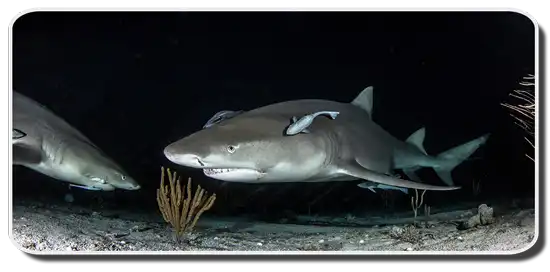The Lemon Shark, also known as the Negaprion Brevirostris, is the best known and most researched of all sharks. Unlike most sharks, the Lemon is able to handle captivity for extended periods of time. Therefore, scientists have had the opportunity to observe their behavior like no other shark.

An adult Lemon Shark is usually about 3.5 meters (11 feet) in length and about 190 kilograms (about 420 pounds) in weight. It is named for its unusual and bright yellow or brown pigmentation and color.
Habitat
The Lemon Shark loves the tropical and subtropical waters in coastal areas of the Atlantic and Pacific Oceans. They stay in moderately shallow water, normally going no deeper than 80 meters (roughly 260 feet). They are often found in shallow waters near coasts and islands, by coral reefs, mangroves, bays, and sometimes even river mouths.

Sensory System
Like all other shark species, they have electro receptors which allow them to track prey by the electric impulses that all living things emit.
In addition to using electro receptors, they also have an astounding olfactory sense through magnetic sensors in their nose. This helps make up for their very poor vision.
Hunting System
Because this shark is a bottom dweller, they often track their prey by churning up the ground for bony fish, rays, crustaceans, and sometimes even seabirds.

Social Behavior
This is a very social species. They are often seen in groups and have a structured hierarchy system based on size and sex. They generally don’t show any aggressive behavior with each other and coordinate in groups for hunting purposes in places the hierarchy is strictly followed.
This species is known for migrating from area to area and often wander hundreds of kilometers through the Ocean to reach mating locations.
Size, Age, and Growth
Lemon Sharks are viewed as one of the larger species of sharks; achieving lengths between 95-120 inches! The maximum length achieved by these species is around 125-135 inches long! These sharks usually have a growth rate of .21 inches/year; a pretty respectable rate for a shark species! Baby Lemon Sharks (pups) will be about 24-26 inches in length.

Offspring
Since they are viviparous, females give birth to live pups. Typically, the birthing cycle lasts for one year and they give birth to between 5 and 20 living pups at a time.
Young pups stay close to lagoons and reefs for shelter and protection. When they reach adulthood, around 10 to 15 years old, they migrate into deeper seas.
Human Interaction
Since these sharks are gentle animals and generally non-aggressive towards humans, they are very popular shark divers. There has never been a recorded fatality due to a Lemon Shark bite and most bites are the result of the shark being spooked. The majority of the time, these sharks are gentle and tend to avoid conflict.
Ten Fast Facts About The Lemon Shark
 1. Lemon Sharks Get Their Name For Their Skin Color:
1. Lemon Sharks Get Their Name For Their Skin Color:
Lemon Sharks have an unusual yellow-brown coloring that resembles a lemon. As shallow-water seafloor hunters, their unique yellow skin helps camouflage them against the sandy seafloor. This coloring helps them go undetected so they can quickly launch and attack prey before they even noticed they are there.
2. Lemon Sharks Have Unusual Habitat Preferences:
Lemon Sharks live in subtropical waters along the coastlines, though they will occasionally venture out into open ocean water at depths of 300 ft (92 m). They mostly live in mangroves, coral reefs, and river mouths where they can hunt a variety of prey. They also thrive in brackish waters and can swim upstream into freshwater rivers, though only for short periods as they do not have the evolutionary adaptations to stay buoyant in fresh water for long periods. Their habitat choices are primarily why it is common for humans to see them in the ocean because they tend to populate the areas around tourist beaches.
3. Lemon Sharks Have Unique Biological Traits:
Lemon Sharks are average sized and tend to only grow to 7.9-10.2 ft (2.4-3.1 m) in total length. They weigh on averages 200 lb (90 kg) by adulthood. The largest recorded Lemon Shark was 11.3 ft (3.43 m) weighing a hefty 405 lb (183.7 kg). They have a flat head, broad snout, and stocky, muscular bodies. They have two dorsal fins that are nearly the same size, which is particularly unusual among any shark species.
4. Lemon Sharks Unusual Eyes:
They have very poor eyesight so they rely primarily on electroreceptivity to hunt prey and navigate the waters. However, Lemon Sharks tend to live in murky waters, so they have adapted unique eyes to help them see. Like humans, the eyes of the Lemon Shark contain both rods and cones which help them pick up shapes and colors. They have a special retina that reduces glare and helps them see very light wavelengths in the yellow-green color spectrum.
5. Lemon Sharks Are Impressive Hunters:
Lemon Sharks are nocturnal predators and are actually surprisingly picky eaters. The prefer prey that is slow and easy to capture like parrotfish, mojarras, and crustaceans. Lemon Sharks hunt for prey using electroreceptors in their head. Once they’ve picked up an electrical pulse from the movement of a potential victim, they will stalk their prey until the opportune time to attack. Unlike other sharks that will grab chunks of prey, Lemon Sharks will bite at their prey until they get a good firm grip then will shake their head side to side until they tear its flesh.
6. Lemon Sharks Often Hunt Together:
Scientists have observed what is known as “feeding frenzy” behavior among Lemon Sharks. When they detect movement of a large school of prey in the water, they will attack in a coordinated, directed group assault. They will also scavenge together and share any found carrion.
7. Lemon Sharks Are Extremely Social:
Lemon Sharks primarily live in social groups. They tend to stay with sharks that are of comparable physical size, but when younger will tend to group with larger sharks for protection. Researchers have notices that these groups have complex social rules, dominance hierarchies, and are highly cooperative. They have also found that Lemon Sharks essentially share information about prey, hunting techniques, and hunting grounds. Lemon Shark groups are similar to wolf packs in terms of social complexity because they have extremely large brains.
8. Lemon Sharks Have Complex Mating Rituals:
Since they are highly intelligent social species, they also have very complex mating rituals. They tend to congregate in mangroves every two years to reproduce. Lemon Sharks find potential mates using the same electroreceptors they use for hunting. Once they’ve found a potential mate they will participate in a range of mating rituals from shows of dominance to dancing to selective biting. Lemon Sharks will also mate with several mates in a cycle. One litter of Lemon Shark pups will typically have multiple fathers. The fathers are determined by sperm competition within the womb.
9. Lemon Sharks Can Withstand Captivity:
Most sharks do not fare well in captivity because of their narrow habitat requirements and unique biological characteristics. However, Lemon Sharks are surprisingly tolerant of captivity and can thrive in enclosed spaces. Typically, the sharks featured in aquariums and zoos are Lemon Sharks because of this ability. Though ideally, Lemon Sharks would live solely in the wild, captivity affords the opportunity for more intensive study of this amazing species while also helping promote breeding and conservation efforts.
10. Lemon Sharks Pose No Threat To Humans:
Even though, humans and Lemon Sharks interact routinely because of their shared ocean habitat preferences, Lemon Sharks are not aggressive towards humans. In fact, there have only been 10 Lemon Shark attacks ever documented and in each case it was a provoked attack where the victim survived. Humans on the other hand are a threat to Lemon Sharks. Lemon Sharks are highly praised for their meat and leather, so they are now listed as “endangered” by the ICUN because of heavy overfishing especially in the Northwest Atlantic and Eastern Pacific Oceans.
These Lemon Shark facts show just how this species is truly unique. Lemon Sharks are relatively abundant and the study of these great sharks can dispel the myths about sharks being aggressive, mindless predatory hunters. Lemon Sharks are instead social, intelligent, and stealthy. So next time you’re at the beach or an aquarium, keep your eyes out for these interesting creatures.
